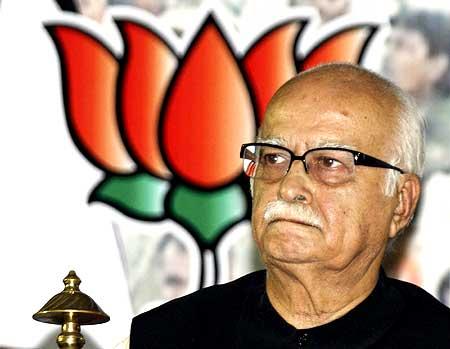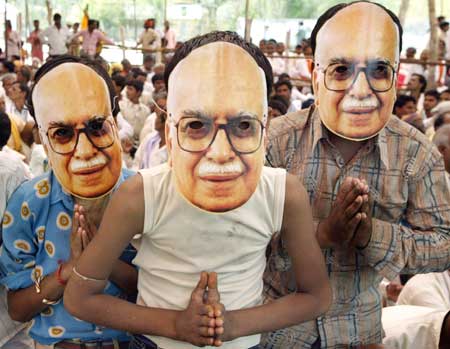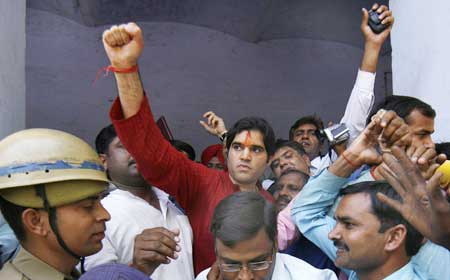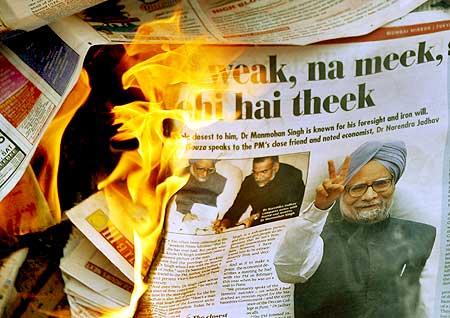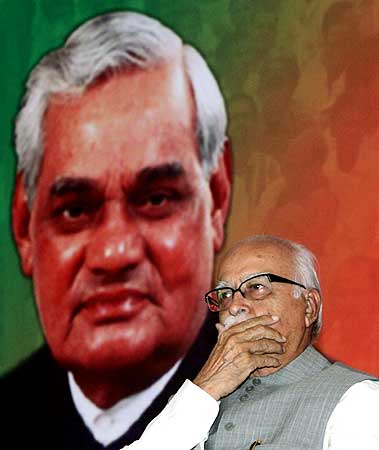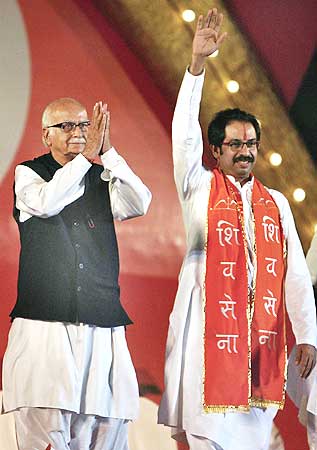 | « Back to article | Print this article |
Why the BJP lost Elections-2009
Most media pundits and Bharatiya Janata Party supporters were surprised with the party's performance in the 2009 Lok Sabha elections. It was always in doubt whether the BJP-led National Democratic Alliance would reach the magical figure of 272, but optimists believed that post-electoral alliances could help.
After the death of Lokmanya Tilak, Mahatma Gandhi took total charge of the Congress. Somewhere along the way, he felt that representing Hindus alone would not enable him to be India's foremost leader, so he sought support of the Muslim community by supporting the Khilafat Movement in 1919 (protests by Indian Muslims against the abolishing of the Caliphate in Turkey) and Hindu Muslim unity.
L K Advani was respected by most Hindus. He too felt that the dream of becoming prime minister could be realised only when he became acceptable to the Muslims and allies who had Muslim support. The visible point of his transformation from a Hindutva warrior to a secular person was his visit to the Jinnah mausoleum in Pakistan and his controversial remarks during a visit to Karachi in June 2005. Advani, thus sought to become secular, as the Congress leaders have been, for over 75 years. This required him to ignore Hindu concerns and pain, overlook Islamic terrorism and Christian evangelism.
Ironically the man who coined the term 'pseudo-secularism' for the Congress, became one himself.
Column by: Sanjeev Nayyar, founder of esamskriti.com
The joy in the Advani camp was premature
It was hoped that the makeover would inspire Muslims to vote for an Advani-led NDA. That did not happen. When a politician, actually any human being, has for over 60 years stood for certain values and does an about-turn in the winter of his life, people question the credibility of such a leader.
The joy in the Advani camp on his being nominated as BJP's prime ministerial candidate was misplaced, premature as if he had already become the PM. By virtue of being declared PM in waiting, his opponents had months to design a strategy to counter him, because BJP prepared no satellite-booster to launch him to the winning post! Certainly by virtue of being the tallest leader in the BJP, had the NDA won, Advani would surely have become PM. BJP laid excessive emphasis upon his pre-eminence, while the Congress used the campaign period to cleverly cover up the deficiencies of its five-year rule.
Was Advani truly tough?
What went wrong? Was Advani truly tough? When party general secretary Arun Jaitley openly heckled party president Rajnath Singh, causing embarrassment during the heat of battle, the PM in waiting remained mute but appeared to side with his own lackey (Jaitley). When the BJP's Pilibhit candidate Varun Gandhi was arrested for making inflammatory speeches, the party seemed to favour politely dropping him (it told the Election Commission that he was not yet the official candidate.) Then, under the illusion that Varun's outburst would lead to consolidation of Hindu votes, it went ahead with his candidature.
BJP failed to bring forth UPA-rule's shortcomings
Instead, Advani could have said those events happened during NDA rule but the frequency of terrorist attacks was higher under the UPA. Five years of UPA rule saw bomb blasts in Bangalore, Delhi, Mumbai, Ahmadabad, Hyderabad, Jaipur, Gauhati, Varanasi and so on. More importantly the state governments of BJP-ruled Gujarat and Karnataka arrested those behind blasts unlike the Congress-Nationalist Congress Party government in Maharashtra where the trial for July 2006 train blasts is proceeding at a snail's pace. The BJP could have pointed out that 16 years later, those involved in the 1993 Mumbai blasts are still not convicted. The UPA government has not pursued the case in the Supreme Court with the same vigour, as say, those relating to the post-Godhra riots in Gujarat.
Advani could have compared the NDA's response to Pakistan post the attack on Parliament in 2001 vs. the Mumbai attack in 2008. The NDA launched Operation Parakram, the largest mobilisation of the armed forces since the 1971 war. Three strike corps were deployed along the border with Pakistan; waiting for orders to go across. Both fleets of the Indian Navy were combined and deployed off the coast of Pakistan; Pakistan's airlines were denied the right to fly over Indian airspace. These were tough measures.
Conversely, except making a noise and seeking the United States' support, the UPA did not take any concrete measures against Pakistan. The result of their approach is reflected in recent events -- when India expressed displeasure on June 2, after 26/11 mastermind Hafiz Saeed was freed from house arrest by the Lahore High Court, the Pakistan Prime Minister responded, 'Solve Kashmir dispute in accordance with UN (United Nations) resolutions.' The same old story again.
Advani and Vajpayee's approach differed
Advani could have cited Home Minister P Chidambaram's recent statement that he too would have released hostages, if faced with a similar situation. Or, like Gujarat Chief Minister Narendra Modi said in an interview to Headlines Today, he could have pointed out that an all-party meeting discussed the issue and agreed to exchange hostages for criminals. As the Congress leaders were present at the meeting, it should not now distance itself from a national accord.
Having said that, it must be remembered that the NDA government was headed by Vajpayee, and not Advani. Their approach to various issues differed.
By projecting himself as tough, Advani opened the gates for criticism. He should instead have used past examples to prove the NDA approach and let the public decide who is a weakling?
People dislike doublespeak and want their leaders to come out clearly, accept mistakes, not beat around the bush. Rahul Gandhi admitted errors but praised BJP for the highway development program.
About 15 percent of the Indian electorate is in the age group between 18 to 30. The BJP campaign centered exclusively around an 81-year-old PM in waiting. Notwithstanding a blog, website and a facebook campaign, can a 24 year old to relate to Advani.
Instead, the BJP should have shown Advani with numerous leaders from different age groups, atleast some in the 30's, men and women. It should have trained these young leaders in the nuances of media communication well in advance and given them sufficient media exposure. This would have helped the BJP connect with various age groups, present the right combination of age and experience.
BJP became 'secular' like the Congress of 1990's
In an attempt to gain wider acceptance, the BJP became secular like the Congress of the 1990's, meaning it wanted the Hindu vote by default and the Muslim vote by virtue of having now become secular. This alienated its core Hindu constituency and did not bring in the Muslim votes either. The BJP's dilemma is akin to the Congress's in the 1990's - Rajiv Gandhi wanted to keep both the Hindus and Muslims happy. We know what happened!
During its five year tenure, I do not recall any significant action taken by the BJP to create a level playing field for Hindus or assuage Hindu feelings. Why must only Hindu temples be under the control of state governments? In states like Karnataka temple collections become part of the state treasury. Why cannot Hindus, like Muslims and Christians, manage their places of worship? BJP forever referred to the plight of Kashmiri Hindus but did nothing to improve their condition.
The NDA undertook no action to strengthen the provisions of the Foreign Contributions Regulation Act that controls the flow of foreign money into Indian Non Government Organisations. How many people know that between 1993-94 and 2006-07, Rs 64,670 crore was the sum of foreign contributions (external link) received into India NGO's (mostly Christian organisations) and these contributions increased by over 100 percent since the UPA came to power.
Unlike the BJP, the Congress is very clear that the minorities and the Dalits are its principal vote banks and goes out of its way to woo them.
The Hindutva tango
Now take the Pakistan PM's recent statement on resolution of the Kashmir dispute in accordance with UN resolutions. The world knows that the UN resolutions require Pakistan to vacate Pakistan Occupied Kashmir first before any talk of implementing the resolution. I do not recall any Congress leader telling the Pakistani government this!
Management of the BJP allies has left a lot to be desired. Wherever the BJP has a regional ally, the ally has invariably weakened the BJP. It had pockets of support in West Bengal and Andhra Pradesh. The tie-up with the Trinamool Congress and the Telugu Desam Party in 2004 decimated the BJP. Biju Janata Dal chief Naveen Patnaik used the BJP to get into power, consolidate his position and left BJP in the lurch. Janata Dal-United chief Nitish Kumar in Bihar may go the Patnaik way.
On the other hand Rahul Gandhi showed the Samajwadi Party-Rashtriya Janata Dal their place by making the Congress fight the UP, Bihar elections on its own steam. The results say it all.
Why on earth did Jaswant Singh fight the election from Darjeeling and support Gorkhaland? The clamour for this new state has created enough problems since the 1990's; no Bengali can support Gorkhaland. This one seat alienated Bengalis in the entire state.
BJP did not attack Congress
Deep down, Advani knew that this was the last fight of his life, a fight to make his dream come true. Spiritually speaking, when a person gets too attached to the fruits of his action, the object of desire becomes more and more difficult to achieve (ma phalesu kadachana).
The BJP-led NDA government did some excellent work but leaders did not talk about it:
The 1998 nuclear tests marked a turning point in India's post independence history and compelled the world to look at her differently.
Yashwant Sinha inherited a difficult fiscal situation after Chidambaram's dream budget of 1997 but left the government of India finances in a very healthy situation in 2004. The fiscal deficit for March 2009 could be as high as 7 percent of the Gross Domestic Product. As Foreign Minister Sinha urged Indian industrialists to acquire foreign companies abroad, rather than focus on the domestic market only.
The NDA government conceived the project to convert and strengthen existing national highways to four-laned ones and followed it up with quick progress on National Highway Development Program. Their contribution is widely acknowledged across the political spectrum. The UPA record on NHDP was dismal; the BJP-Shiv Sena government conceived and implemented India's first expressway from Mumbai to Pune.
After Sukh Ram's disastrous stint in the telecom ministry, Arun Shourie oversaw the creation of a regulatory framework for telecom companies.
The BJP could have used its past performance and medium term vision to communicate a clear message to the voting public. It did not use plain statistics to criticise the Congress.
It could have promised Hindus a level playing field in all areas that do not concern Muslims or Christians, thereby avoiding conflict.
Somehow one got the feeling that the BJP had not kept a detailed record of the UPA regime's misdeeds. Collection, analysis and dissemination of the UPA government's performance should start now and be regularly done for the next five years.
The BJP has to decide what it stands for and then live with it through thick and thin. It cannot keep oscillating like a pendulum. All along it opposed the nuclear deal with the US, then suddenly during the elections it changed tack and said it would not renegotiate the deal if voted to power. Where was the need for this statement considering that the nuclear deal was a non issue?
The BJP must realise who its principal opponents are. One is the media and two the Congress. A short to long term strategic plan needs to be designed accordingly. Execution is the key.
